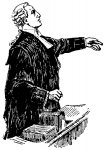Do the lawyers care? – Ask the Rabbi
Q. Is there a Jewish perspective on criticising lawyers?
 A. What clients often say about legal practitioners is that they don’t seem to care. No longer do people have long-standing professional relationships with a benign, trusted doctor, lawyer, accountant or minister, often known and trusted by them and their family for many years. Today’s society is more driven and unrelaxed.
A. What clients often say about legal practitioners is that they don’t seem to care. No longer do people have long-standing professional relationships with a benign, trusted doctor, lawyer, accountant or minister, often known and trusted by them and their family for many years. Today’s society is more driven and unrelaxed.
Abraham Joshua Heschel comments on this phenomenon in relation to doctors and patients, and what he says applies to all professionals and their clients. Writing on “The Patient as a Person”, in his book, “The Insecurity of Freedom” (1966), Heschel remarks, “What many of us fear is the collapse of the old and traditional esteem for the character of the doctor, an increasing alienation between the healer and the sick.
“By many people the doctor is alleged to act like an executive, and the patient is only a consumer … The patient must not be defined as a client who contracts a physician for service; he is a human being entrusted to the care of a physician … Few experiences have such a decisive impact upon our ability to understand the meaning of being human as the way in which the doctor relates himself to us at such times.”
Martin Buber, celebrated for his philosophy of dialogue, speaks of two types of relationship, “I-Thou” and “I-It”. “I-Thou” is when I enter the very being of another person or even a piece of music, art or literature, a cherished possession or a place, and both are transformed by the experience. “I-It” on the other hand is cold, business-like and utilitarian; it has its decided uses, but it lacks emotion, concern and commitment.
The relationship of professional to client should be both – “I-Thou” and “I-It”. There are times to maintain a distance in order to be the expert, the authority, the one who makes judgments. There are also times when professional and client can and should enter into each other’s being and find a depth in their relationship which changes the life of both of them.
The ethic of the lawyer-client relationship may be summed up in the Biblical words, shalom shalom larachok velakarov – “peace, peace to him that is afar and to him that is near” (Isa. 57:19). The lawyer must know when to keep a distance and when to be near. There are times to tell the client what needs to be told; but deep down both need to understand and trust each other. As the client needs the lawyer, so the lawyer needs the client.
This is the ideal, and insofar as the lawyer, even just one lawyer or two, might need to humanise him or herself and see the client as a person, the effort is indispensable if respect for law is to be rebuilt and if the law is to help bring about harmony and stability in society.



